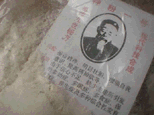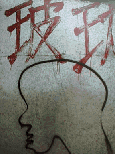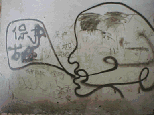| Wang Gongxin's installation consists of three components: Arrayed on the floor of a large room are hundreds of ziplock bags. |

A Chinese potion that cures any ailment to which gullible people are susceptible, PLUS "boosts your guts, sharpens the eyesight, improve self-consciousness, and strengthen sense of leadership." |
|
On a bank of monitors at the entrance to the room, a video demonstrates the use
of the medicine. A young woman adds water to the potion, and slops the paste
on one eye.
The third element of the work, a projection that covers one wall, documents a peculiar Beijing phenomenon. Every morning seniors gather in neighborhood parks to march and chant, often slipping into self-induced, ecstatic trances. Their activity derives from Qi gong, a traditional practice allied to Daoism. But their chants are more like contemporary self-improvement exercises - "my stomach is good," "my heart is good." The artist Wang finds the chants remarkable because they often are extemporaneously inventive, full of clever word-play on Maoist worker songs. After the Cultural Revolution destroyed every basis for national consensus, the people's search for something to believe in has produced disparate bedfellows - Daoist chants, Maoist patriotic songs, "I feel good" self-hypnosis, and a dash of quackery. |

|
